Content

 |
OSUN STATE UNIVERSITY, P.M.B 4494, OSOGBO NIGERIA |
ACADEMIC CALENDAR FOR 2015/2016 ACADEMIC SESSION
CALENDAR FOR 2014/2015 ACAEMIC SESSION
SEPTEMBER 2015
Monday, 21st September: Foundation Day
Wednesday, 2nd 22nd September: Consideration of Results at Departmental, Faculty and College Level
Saturday, 31st October: End of Result Processing to Senate
CALENDAR FOR 2015/2016 ACADEMIC SESSION
NOVEMBER, 2015
Monday, 9th November: Assumption of studies by Fresh Students
Monday, 9th November: e-Registration for all Students for Harmattan Semester 2015/2016
Monday, 16th November: Resumption for returning students/commencement of Lectures for all Students
Wednesday, 11th November: Orientation for fresh Students
Tuesday, 17th November: End of Orientation for fresh Students
Monday 23rd November: e-Registration ends for all Students
Tuesday, 24th – Tuesday, December 1st: Late Registration with Penalty
Wednesday, 2nd December: Late Registration with Penalty ends
DECEMBER, 2015
Monday, 7th December: Management Meeting
Monday, 8th December: College Board of Agriculture, Education, Health Sciences &Law.
Tuesday, 9th December: College Board (SET ,Management and Social Sciences, Humanities and Culture)
Tuesday, 9th December: Board of Postgraduate Studies
Wednesday, 10th December: Committee of Provosts, Deans and Directors.
Thursday, 11th December: Business Committee of Senate
Friday, 12th December: University Research Committee
Monday, 15th December: Management Meeting
Tuesday, 16th December: Matriculation of Fresh Students
Wednesday, 17th December: Library Committee/ Security Committee
Thursday, 18th December: Academic Planning sub- Committee/ Senate
Friday, 19th December: Staff- Students Colloquium
Monday 22nd - Sunday, 3rd January: End of the year Break
JANUARY, 2016
Monday, 4th January: Resumption after New Year Break and Continuation of Lectures
Monday 4th January: Management meeting
Tuesday 5th January: Board of Postgraduate Studies
Wednesday 6th January: Committee of Provosts, Deans and Directors.
Thursday 7th January: Development Committee
Friday 8th January: University Research Committee
Monday, 11th January: Security Committee
Thursday, 28th January: Senate
FEBRUARY, 2016
Monday 13th February: End of Lectures (Harmattan)
Monday, 18th February - Saturday, 20th: Revision week/ Lecture Free Week
Monday, 22nd February - Monday, 11th March: Harmattan Semester Examinations
Monday, 22nd February - Friday, 26th February: GNS Examinations
Wednesday 24th February: Security Committee
Monday, 11th March: End of Harmattan Semester Examinations
MARCH 2016
Monday 14th March - Sunday 20th March: Harmattan Semester Break
Wednesday, 21st March: e-registration for all Students for Rain Semester 2015/2016 Session
Wednesday, 21st March: Resumption/Commencement of Lectures for all Students
Thursday 17th March: Security Committee
Thursday 24th March: Staff-Students Colloquium
Thursday 24th March: Board of Postgraduate Studies
Thursday, 31st March: Late Registration with Penalty ends
Thursday, 31st March: Senate
APRIL, 2016
Monday 4th April: End of e-registration for Rain Semester
Tuesday April 5th - Tuesday April 12th: Late Registration with Penalty
Tuesday, 5th April: Finance Sub-Committee
Wednesday, 6th April: Special Meeting of Committee of Provosts, Deans and Directors
Monday, 11th April: Ceremonials Committee
Tuesday,12th April: Business Committee of Senate
Wednesday 13th April: Late Registration with Penalty ends
Wednesday, 13th April: College Board (Agriculture, Education, Health Sciences and Law)
Thursday, 14th April: Board of Postgraduate Studies
Friday, 15th April: Appointments and Promotions Committee (Administrative and Technical)
Friday, 15th April: College Board (Sciences, Engineering and Technology, Management and Social Sciences, Humanities and Culture)
Friday, 15th April: University Research Committee
Monday, 18th April: Security Committee
Thursday, 28th April: Senate
MAY, 2016
Wednesday, 4th May: Special Meeting of Committee of Provosts, Deans and Directors
Thursday, 5th May: Finance Sub-Committee
Monday, 9th May: Ceremonials Committee
Tuesday, 10th May: Business Committee of Senate
Wednesday, 11th May: College Board (Agriculture, Education, Health Sciences and Law)
Wednesday, 18th May: Security Committee
Thursday, 12th May: Board of Postgraduate Studies
Friday, 13th May: Appointments and Promotions Committee (Administrative and Technical)
Friday, 13th May: College Board (Sciences, Engineering and Technology, Management and Social Sciences, Humanities and Culture)
Friday, 13th May: University Research Committee
Thursday, 26th May: Senate
JUNE, 2016
Friday 17th June: End of lectures for Rain Semester
Monday 20th June: Saturday 25th June Revision week / Lecture Free week
Monday 27 June: Friday 15 July Rain Semester Examination
Monday 27 June: Friday July 1 GNS Examination
Wednesday 22nd June: Security Committee
Thursday, 30th June: Senate
JULY, 2016
Tuesday, 5th July: Faculty Board (Agriculture, Education and Law)
Wednesday, 6th July: Faculty Board (Sciences, Management and Social Sciences)
Thursday, 7th July: Faculty Board (Health Sciences, Engineering and Technology, Humanities and Culture)
Friday, 8th July: Ceremonials Committee
Monday, 11th July: Academic Planning Sub-Committee
Wednesday, 13th July: University Research Committee
Thursday, 14th July: Committee of Provosts, Deans and Directors
Friday 15th July: End of Rain Semester Break
Monday, 18th July: Management Meeting
Tuesday, 19ht July: Development Committee
Wednesday, 20nd July: Finance Sub-Committee
Thursday, 21st July: Business Committee of Senate
Thursday, 21st July: Library Committee
Wednesday, 27th July: Security Committee
Thursday, 30th July: Senate
AUGUST, 2016
Monday,1 August: Principal Officers Meeting
Tuesday, 2 August: College Board (Agriculture, Education and Law)
Wednesday, 3 August: College Board (Sciences, Management and Social Sciences)
Thursday, 4 August: Committee of Provosts, Deans and Directors
Friday, 5 August: College Board (Health Sciences, Engineering and Technology, Humanities and Culture)
Monday, 8 August: Principal Officers Meeting
Tuesday, 9th August: College Board (Agriculture, Education and Law)
Wednesday, 10th August: College Board (Sciences, Management and Social Sciences)
Thursday, 11th August: Committee of Provosts, Deans and Directors
Friday, 12th August: College Board (Health Sciences, SET, Humanities and Culture)
Monday 15th August: Commencement of Annual leave for Academic Staff
Monday, 15th August: Security Committee
Tuesday, 16th August: Library Committee
Wednesday, 17th August: University Research Committee
Thursday, 18th August: Academic Planning Sub-Committee
Friday, 19th August: Development Committee
Monday, 22th August: Staff-Students Colloquium
Tuesday, 23rd August: Board of Postgraduate Studies
Wednesday, 24th August: Committee of Provosts, Deans and Directors
Thursday, 25th August: Senate
Friday, 26th August: Finance Committee
Monday, 29th August: Management Meeting
Wednesday, 31st August: Management Meeting
Wednesday, 31st August: End of 2015/2016 Session
CALENDAR FOR 2016/2017 ACADEMIC SESSION
OCTOBER 2016
Monday, 3: Opening of e-Portal for registration and Payment of fees for all students
 |
OSUN STATE UNIVERSITY, P.M.B 4494, OSOGBO NIGERIA |
ACADEMIC CALENDAR FOR 2015/2016 ACADEMIC SESSION (AMENDED)
CALENDAR FOR 2015/2016 ACADEMIC SESSION
MARCH, 2016
Wednesday, 30th March – Sunday, 3rd April: Harmattan Semester Break
APRIL, 2016
Monday, 4th April: Resumption for Rain Semester
Monday, 4th April – Friday, 15th April: e-Registration for all Students for Rain Semester 2015/2016 Session
Friday, 22nd April – Friday, 29th April: Late Registration with Penalty
Monday, 11th April: Commencement of Lectures for Rain Semester 2015/2016 Session
JULY, 2016
Friday, 15th July: End of Lectures for Rain Semester
Monday, 18th July – Friday 22nd July: Lecture Free Week
Monday, 25th July – Friday, 19th August: Rain Semester Examination
Monday, 25th July – Friday 29th July: GNS Examination
SEPTEMBER, 2016
Thursday, 1st September: Commencement of Annual leave for Academic Staff
CALENDAR FOR 2016/2017 ACADEMIC SESSION
OCTOBER 2016
Monday, 3rd October: Opening of e-Portal for registration and Payment of fees for all students
Brief History of the Department
Nursing Science has being one of the courses proposed for the College of Health Sciences at the point of establishment but the decision to run the programme was actualized in 2014 when the National Universities Commission (NUC) was invited and visited for “Resource Verification” to confirm the preparedness of the University to mount the programme. Prior to this, a team of Academics in Nursing assisted in developing the curriculum using the NUC Minimum Academic Benchmark Standard (BMAS) and the Nursing and Midwifery Council of Nigeria’s Standard for Education and Practice (2010) and other relevant curricula (NMCN’s General Nursing and Midwifery curricula and the West African Health Examination Board Curriculum) as guide. Equipment for the Nursing and Midwifery Laboratories were also provided before the Resource Verification Exercise. Clinical sites for students’ clinical learning were identified and Memoranda of Understanding signed with the management of some facilities for clinical experiences of students, and more are being processed with other sites. A departmental library to complement the University library was also provided. Following resource verification in 2014, the University continues to improve resources for the programme by providing more facilities (more offices, more classrooms, the Public Health Nursing Laboratory, e-library supported with e-books and e-journals for use of students and staff of the department; recruitment of more staff). The programme started with a student population of 72 though only 54 of the admitted students successfully passed to 200 level to get to the College of Health Sciences for the 2014/2015 session. The first set of students to the BNSc degree programme was admitted to the College after the NUC Resource Verification Exercise and a positive report from the National Universities Commission for the 2014/2015, 2015/2016 and the students for 2016/2017 have just resumed at the University.
BACHELOR OF NURSING SCIENCES DEGREE PROGRAMME (BNSc )
1.0 Introduction
University education for the nurse within the global framework gives recognition to the professional requirement and challenges of responding to health and health care needs of diverse populations with different health care needs. The professional nurse with university education acquires appropriate knowledge to drive his/her competencies to provide quality care based on new evidence in meeting individual and group health care needs within the lifecycle framework. Providing quality care in a consistently changing health care system driven by evidence in the multidisciplinary environment of care also challenges the nurse in the 21st century to have a responsive education that prepares him/her to function in a technologically moderated environment. The nurse with university education in the Nigeria context would also be expected to function in the health team with high intellectual capacity to resolve peculiar health care needs of Nigeria citizens and yet have high capacity to perform in a dynamic global context of international education.
The BNSc degree programme, through liberal and professional education prepares the nurses who can engage in intellectual discourses and analysis, critical thinking, who can use evidence to inform judgments and communicate thoughts clearly within the context of appropriate value clarifications. The graduate of the BNSc programme is capable of performing nursing skills in a variety of settings and across the three levels of primary, secondary and tertiary health care, therapeutically assisting individuals with diverse backgrounds and health problems. She/he will understand the social, psychosocial, and physical factors involved in the promotion, maintenance and restoration of health and will be able to analyse these factors in the context of how they translate to health needs while also relating them to appropriate health services, programmes and nursing care for the benefits of the consumers of health care. She/he will be able to assess health programmes in their broadest scope, with major emphasis on how such programmes or services contribute to the promotion, maintenance and restoration of health. She/he will be able to relate the role of the health services to the broader social system.
The Bachelor of Nursing Science (BNSc) degree programme is unique in the context of preparing polyvalent graduate nurses who are capable of meeting diverse health care needs of different people as individuals and groups across the life span yet in a health care framework that gives priority focus to primary health care. The graduate from the programme also has desirable base to practice in secondary and tertiary health care settings with high potentials for higher education and advance practice in an ever changing health care environment. These understanding of the nature of the graduate nurse from the BNSc degree programme and the national and international context of practice and professional growth gives guide to the philosophy, the contents of the curriculum and the implementation of the programme at the College of Health Sciences of the Osun State University.
2.0 The Philosophy of the Programme
The philosophy of the BNSc degree Programme derives
• The nature of human beings who are the consumers of health care and nursing services
• The professional context of nursing, nursing education and practice globally and in Nigeria
• The objects, vision and mission of the Osun State University
The Programme believes that:
(i) Human beings as bio-psycho-social beings have health and health care needs that are the focus of nursing; all functions and activities in professional nursing practice are directed at helping human beings as members of families and communities to achieve optimal health within the bio-psycho-social framework. It is believed that nursing is a helping process of interactions, working with people as individuals, families and communities to attain, maintain, restore and sustain optimal level of healthy living at the primary, secondary and tertiary levels of care.
(ii) Working within the health team, in which the individual, the family and the community play significant roles, is the most effective approach to promotion, maintenance and restoration of health.
(iii) professional nursing practice in the century and thereafter depends on programmes that can maximise knowledge from the arts, sciences, humanities and nursing for evidence based professional practice as depicted by involvement in research and continued acquisition of new knowledge and promotion of self development through self-directed learning by graduates
(iv) the roles and responsibilities of the nurse are changing and a professional nursing programme should build capacity of learners in analysing the change process, in deciding on change which is desirable or undesirable, possible, probable, or impossible, and in accepting responsibilities to take action for what would be needed to support change.
(v) The nurse, prepared for professional nursing practice through liberal and professional education and capable of using multiple resources (human and material) should have high competence in helping the individual, family and community to manage their health benefitting maximally from health care services with the nurse doing this through the use of the analytic-synthetic process, the application of appropriate technical skills and feeling response, and in cooperation with other disciplines.
(vi) For the nurse to engage in professional practice that will be protective of consumers of nursing services, he/she must be highly knowledgeable to be able to engage in the cognitive analytic-synthesis process, and must be highly competent as to efficiently apply appropriate technical skills using up-to-date technology in helping clients and must be highly responsive to human feelings as he/she works in cooperation and collaboration with clients and other health and social science disciplines in the multi-disciplinary health care environment .
(vii) The education of the nurse to meet the demands of changing health care needs of individuals, families and communities in a rapidly …..changing
(viii) Nursing is a science that is based on the knowledge of behaviors that enable changes in the client system to be monitored by utilizing the scientific method of inquiry whilst providing nursing intervention to individuals, families, groups and communities at the primary, secondary and tertiary levels of health care.
(ix) Professional nursing education is built upon a theoretical base that seeks to develop continuous self-directed practitioners who will advance and test knowledge on which practice is based. Current health care demands require an innovative approach in professional preparation, and a curriculum that is responsive to the changing health needs of the society.
(x) Learners should be assisted in using relevant and proven learning methods that support problem solving based on rational knowledge moderated by emerging trend in technology.
3.0 The Aim of the Programme
The programme aims to develop highly competent nurse clinicians that will service health care needs of people in a scientifically responsive environment and can professionally advance their practice through continuous self-directed learning and higher education.
4.0 The Objectives of the Programme
1. To uphold the academic standard of Osun State University that is highly competitive in meeting national and international requirement as such speaks to the nature of nursing education and practice.
2. To provide a teaching-learning environment that is facilitatory to wholesome development of students and faculty.
3. To promote the institutionalization of the team concept in teaching and service delivery adopting efficient use of technology for optimal outcomes for students and consumers of health care services.
4. To mentor students into leadership responsibilities by facilitating their participation in group and professional association activities.
5. To develop problem solving potentials and research interest of students by exposing them to problem situations and by mentoring them through the research process and in conduct of research projects.
6. To graduate professional nurses capable of giving high quality nursing care to individuals and communities of diverse backgrounds, and in a variety of social and cultural settings.
7. To cooperate with relevant bodies to advance nursing knowledge especially as such relates to improved learning and improved practice by the students and graduates
8. To support the participation of faculty members and students in University and professional affairs.
9. To evaluate the educational programmes of the department in the light of:
i. the educational objectives;
ii. the health needs of the nation;
iii. the needs of the learners
iv. emerging trends in nursing education globally; and
v. emerging trends in curriculum development and implementation
10. To sustain active recruitment process through the quality of programme.
11. To develop and maintain audio-visual, and other learning resources.
12. To formulate future plans and seek funds to maintain high educational standard and training programmes for improved performance of staff in the programme.
5.0 LEARNER FOCUSSED OBJECTIVES.
The student, on completion of the programme, should be able to demonstrate verbally, in writing and practice the following:
A. Knowledge of:
1. Physiological and psychosocial determinants of health and health status
2. Patho-physiological determinants of diseases
3. The scientific principles and nursing theories that are the basis of nursing care of individuals and groups of all ages and of diverse health status in a variety of physical and social settings;
4. The nursing process and standardized nursing language;
5. The communication process and group dynamics;
6. The process of scientific inquiry; and
7. The functions of members of the health team and their inter-relatedness and interdependency
8. Application of information technology in nursing care
9. Economic dimensions of health care programming and health care access.
B. Skills in:
1. Health assessment of individuals
2. Identifying health needs; planning and giving comprehensive nursing and health care to individuals of all ages in a variety of settings.
3. Applying basic scientific, social, medical and nursing theories, principles and concepts in the practice of nursing.
4. Selecting appropriate health and nursing interventions, and performing technical skills with maximal safety.
5. Effective communication by organising thoughts and expressing such in manners that could be easily comprehended.
6. Planning and effecting health promotion, disease prevention and health restorative activities.
7. Working cooperatively as a member of the health team in Primary Health Care by:
i. Sharing information;
ii. Accepting responsibility and limitation willingly;
iii. Participating in group activities;
1. Utilising standard protocols in giving health care.
8. Applying appropriate evaluation tools and instituting desirable changes.
9. Utilising information communication technology in information management, client education and self development.
C. Attitude that:
1. Recognises the essential worth of the individual through her interpersonal responses.
2. Appreciates varieties in behaviour which may influence the care of the individual; and the family.
3. Shows commitment to the role of nurse and to the nursing profession.
4. Shows sense of responsibility for self-direction and personal growth.
5. Shows respect for the rights of his/her clients as individuals and groups.
6. Reflect positive disposition to use of technology in all aspects of life
6.0 FUNCTIONS THAT WILL BE PERFORMED BY A GRADUATE OF THE BACHELOR OF NURSING SCIENCE
1. the graduate nurse will engage in direct patient care. This involves:
(a) making appropriate health, physical assessment and nursing diagnoses of individuals through the use of:
i. the acquired observation skills and sensory perceptions ; and
ii. simple diagnostic equipments and procedures in client assessment;
(b) making plans related to identified diagnoses;
(c) giving appropriate treatment in Primary Health Care and Emergency and other care situations and making referrals as necessary for further in depth care.
(d) using obtained data and relevant guidelines to make appropriate care plans for the individual and groups and evaluate the effectiveness of the plan through further observation.
(e) communicating significant information from observed data to appropriate member of the health team.
(f) incorporating the medical plan into nursing activities which are based on safe practices supported by scientific principles and concepts;
(g) assisting individuals in identifying realistic health goals and in planning for ways of achieving or maintaining optimum health.
(h) assessing the limitations and capabilities of individuals in assuming responsibilities for personal care, and the degree of assistance from the nurse that will be useful at all levels of care.
(i) provide nursing care to clients/patients in secondary, tertiary and other health care settings working within the scope of role assignments in the health care team.
(j) performing needed technical skills with refined dexterity and feeling response.
2. He/She will teach and demonstrate high quality nursing care to students, health care personnel, patients and families by:
(a) Identifying individual learning needs and formulating appropriate learning content and method;
(b) Using appropriate educational psychological principles and evaluating and revising teaching plans according to progress made in learning;
(c) Precepts through his/her exceptional positive health practices.
3. He/She will function as a leader by:
(a) Recognising his/her own personal behaviour and needs.
(b) Creating an environment conducive to the promotion of high quality nursing care.
(c) Understanding the role of the various members of the health team, thereby planning responsibility and supervision accordingly.
(d) Organising and implementing team work, and working effectively with people.
(e) Making nursing decisions based on pertinent data and scientific principles.
(f) Understanding institutional policies, legal consideration and professional ethics.
(g) Accepting responsibility for his/her own actions.
(h) Identifying his/her own capabilities, responsibilities and limitations.
(i) Coordinating the work of various health care and nursing teams.
(j) Applying nursing decisions in order of priority.
4. He/She will serve as an effective member of the health team in the processes of defining, planning, executing and evaluating the total health plan for members of the community.
5. He/She will initiate research and also work with other members of the health team in multidisciplinary research projects.
6. He/She will interpret nursing activities to groups within and outside the professional health teams.
7. He/She continues to learn by:
(a) continuous participation in the field of inquiry;
(b) acquiring new knowledge and new experience for continuous professional growth and development;
(c) using her potentials for graduate study;
(d) continually questioning the basis for defining nursing activities.
8. He/She will function as a change agent by:
(a) constantly evaluating the milieu in which she practices;
(b) identifying factors which affect the direction of nursing and the area of nursing
chiefly affected;
(c) deciding on change that is imminent and planning strategies for incorporating
this into existing structures;
(d) working with others in the assessment, introduction and evaluation of change.
(e) creatively using technology to moderate all aspects of learning and professional
practice
ADMISSION AND GRADUATION REQUIREMENTS
Admission to Part I, BNSc programme:
Candidates may be considered for admission to Part I, BNSc degree programme after passing at the required level of the University Matriculation Examination (UME) of the Joint Admission and Matriculation Board (JAMB) and the University moderated post-JAMB selection examination provided they obtain a pass in the Senior Secondary School Certificate Examination of the West African Examination Council(WAEC) or National Examination Council (NECO) or its approved equivalent at Credit Level in at least five (5) subjects including English Language, Mathematics, Chemistry, Biology and Physics; and provided that all five subjects are taken and passed at one sitting.
Exemption from Part I, BNSc Programme (Direct Entry):
Candidates for admission to Part II, BNSc Programme by direct entry who are exempted from the Part I, BNSc programme are in the following categories:
i. Candidates who have satisfied the Senior Secondary School Certificate requirements for admission into this university (i.e five credit passes as stated in 7.1 above, and who in addition obtain passes in at least two science subjects including Biology/Zoology, Chemistry and Physics at the General Certificate of Education, Advanced Level or the Higher School Certificate, Principal level or at any other equivalent examinations approved by the Senate of the Osun State University.
ii. Candidates who are holders of the R.N. Diploma of the Nursing and Midwifery Council of Nigeria, or its equivalent as approved by the Senate the Osun State University who have passed at the required Credit level in the Senior School Certificate Examination of WAEC or NECO or its approved equivalents in at least five subjects including English Language, Biology. Chemistry, Mathematics or and Physics and one other subject.
iii After successfully completing a Bachelor of Science degree course in Osun State University or any other University, a candidate may be considered for admission into the BNSc. degree of the University provided such a candidate satisfies the appropriate admission requirements as prescribed in 7.2.(i) above.
7.3 Transfer from other Faculties of Osun State or other Universities:
Candidates who have satisfied the Senior Secondary School Certificate requirements for admission into this university (i.e. 5 credit passes as stated in 7.1 above, and who in addition has passed all the courses expected in part I of the BNSc degree programme with a GPA of not less than 4.0 may be allowed to transfer to part II of the programme.
Duration of the BNSc Degree programme
The BNSc degree programme shall run for five (5) academic years for Unified Tertiary Matriculation Examination (UTME) entry candidates and for four (4) years for direct entry candidates depending on a student’s entry qualification.
Programme Format
Mode of study - candidates are required to register fulltime.
Type of course system – A modified course credit system will be adopted. Courses offered outside the College of Health Sciences will follow the regulations binding the offering of such courses. For all courses in the department additional information are provided. There are courses that run over the session as part I in the first Semester and part II in the second semester.
Course coding system – A system identifying a course using the combination of 3 letters and
3 digits according to UNIOSUN standard is used. The 3-letter designation of NSG will be for all courses offered in the Department of Nursing Science while the first of the three number digits denotes the level. The same principle applies to courses offered in other departments in the College.
Evaluation
Formative evaluation through Continuous Assessment for lectures, tutorials and practical adopting various methods will constitute 30% of the year grade for every course. Summative evaluation in form of final examination covering theory, projects and practical examinations shall be conducted for all courses at the end of every year.
***Candidates to sit for the second and third professional examination for Midwifery and Public Health Nursing by the Nursing and Midwifery Council of Nigeria and West African Health Examination Board respectively when students fulfil all requirements. Candidates take responsibilities for funding of professional examination.
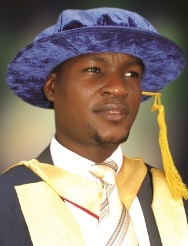 Dr. OYEYIPO Ibukun
Dr. OYEYIPO Ibukun
Head of Department, Physiology
Email:
On behalf of every member of staff, I heartily welcome you to the Physiology Department. As one of the foundation Departments in the College of Health Sciences and indeed the University, we strive to uphold the Philosophy of the University and College, which is to raise men of integrity and who are sound in knowledge.
Why study Physiology? Physiology provides a wide range of career opportunities. It also forms a core discipline for most, if not all medically oriented professions such as Medicine, Dentistry, Physiotherapy, Nursing to mention but a few.
Physiology may look like an abstract and wide subject but it is our intention to make it fun and exciting to all our students. It is believed that at the end of their stay in the Department, they would have acquired enough competence in Physiology through appreciating the various mechanisms through which the body performs normal functions.
This webpage contains basic information that will assist you in familiarizing yourself with the Department.
PROGRAMME PHILOSOPHY, OBJECTIVES, COMPETENCIES AND SKILLS
PHILOSOPHY
The philosophy of the undergraduate physiology programme is to train students in theoretical, practical and applied physiology so that they can utilize the basic knowledge for future problem solving and other applications – like practice of medicine, nursing, pharmacy, physiotherapy, etc. the graduates should be able to function as entrepreneur whether in pubic service or self employed.
OBJECTIVES
i. To train students to acquire basic knowledge of physiological principles.
ii. To train students to acquire sufficient practical knowledge and practical skills in experimental physiology.
iii. To train students who will be able to apply physiology to life situations.
iv. To train students in physiological knowledge sufficient for them to proceed for further studies in related fields of specialization.
v. To train students who can adapt themselves after schooling, to various life situations including entrepreneurship.
COMPETENCIES AND SKILLS
In addition to the subject specific knowledge enumerated above, students on completion of the course of study should acquire the following levels of competence and skills.
i. The students should be trained to achieve cognitive or intellectual abilities to study physiology of ever-increasing modern knowledge on their own during and after the training.
ii. The students should attain practical proficiency and skills such as all basic practical topics in each of the physiology benchmark outlines stated above.
iii. The students should acquire enough practical skills that will enable them engage in physiology or physiology-related postgraduate study or research laboratory anywhere in the world.
iv. Students should have skills and ability to tackle new innovative cases and problem solving or development of new ideas.
v. Students should be able to retrieve and store information, including literature search, using computer as well as other retrieval media (current contents, index medicos, science situation index, excerpter medical, etc).
vi. Students should be able to learn scientific writing in all forms e.g. conference paper, poster presentation, thesis and dissertation, paper for journal publication, etc.
vi. Students should be able to acquire enough skills to us computer as well as long hand for data analysis, graphical preparation and presentation, statistics, word-processing, spreadsheet, internet,etc.
ADMISSION AND GRADUATION REQUIREMENTS
GENERAL
For admission into any of the first degree programmes of the University, a candidate shall be required to possess the following minimum qualifications:
1. Senior Secondary School Certificate (SSCE) or its equivalents with credit level passes in five (5) subjects at not more than two sittings. The candidate must also earn an acceptable score in the Unified Tertiary Matriculation Examination (UTME).
2. Candidates seeking admission by direct entry into the 200 level, must have at least five (5) O/L credits, two of which must be at Advanced Level or approved equivalents.
DEPARTMENTAL ADMISSION REQUIREMENT
UTME Candidates
Candidates seeking admission into B. Sc Physiology programme through the Unified Tertiary Matriculation Examination (UTME) mode must possess credit passes at Senior Secondary School Examination (SSCE) conducted by West African Examination Council (WAEC) or National Examination Council (NECO), General Certificate Examination (GCE) at Ordinary Level or its equivalent in Mathematics, English Language, Biology, Chemistry and Physics at not more than two (2) sittings and an acceptable pass mark at the UTME conducted by Joint Admission and Matriculation Board (JAMB). Such candidate must also satisfy the post UTME requirement of Osun State University.
Direct Entry Candidates
a. ‘A’ level passes in Chemistry, Physics, Biology/Zoology or related discipline may be accepted for direct entry admission into year two of B. Sc Physiology programme.
b. Candidates with Ordinary National Diploma in related Biological Sciences may also be considered for admission through direct entry mode of admission.
Post UTME Screening
All Candidates seeking admission into the University irrespective of their UTME scores shall be required to pass the University post UTME Screening test before being admitted.
Registration Procedure
(a) Students shall complete registration at the beginning of the semester.
(b) Any addition or deletion from the courses for which a student is formally registered must be made with the consent of the course coordinator.
(c) A student may be allowed to withdraw from a course by the course administrator before a third of lectures have been given. Such a student who withdraws after this time or who fails to sit for examination without reasons acceptable to the appropriate Departmental/Faculty/College Board shall be deemed to have failed the course. A Grade point of 0F shall be recorded for the student in the course.
(d) Late registration in the course may be allowed with penalty of up to 4 weeks after the commencement of registration.
Duration of Degree Programmes
The minimum number of years to be spent to be awarded a first degree in a programme of study in non-professional area in the university shall be four years (or three years minimum for direct entry candidates). Registration shall not exceed an additional 50% of the duration of the programme if the student fails to graduate within the minimum number of years.
GRADUATION REQUIREMENTS
To qualify for the award of a degree of Osun State University, a student is required to have:
(i) completed and passed the prescribed number of units including all compulsory courses specified by the University.
(ii) completed and met the standards for all prescribed compulsory, required and elective courses totalling 120 credit units.
(iii) obtained the prescribed minimum CGPA.
MEET OUR STAFF
 Dr. Oyeyipo I. P. Senior Lecturer/HOD |
Mrs Oladokun O.O. Lecturer I |
Dr. Obembe O.O. Lecturer I |
Mr Usman T.O. Assistant Lecturer |
Mr Osuntokun O.S Assistant Lecturer |
| Mr Adeyemi D.H. Assistant Lecturer |
Mr Adedokun K.I. Assistant Lecturer |
Miss Awonuga M.A.M. Principal Technologist |
Mrs Salam A.M. Laboratory Technologist I |
Mr. Osuolala A.D. Senior Laboratory Assistant |
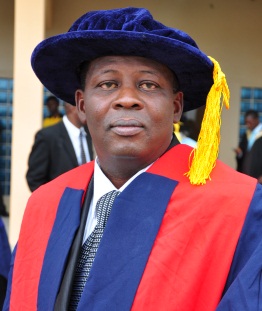 UNIOSUN DEVELOPMENT OFFICE is conceived as a unit saddled with the responsibility to secure philanthropic support for the University.
UNIOSUN DEVELOPMENT OFFICE is conceived as a unit saddled with the responsibility to secure philanthropic support for the University.
This includes producing and implementing a strategy to perfect the University’s self sustenance programme; building a meaningful relationship with stakeholders and facilitating other resource required for effective and long lasting alumni relations, corporate communications, strategic fundraising, and advancement services.
The ultimate task is to raise financial and material resources to augment the government subvention which by day-by-day is dwindling even as the university is growing.
Specifically, the objectives of the Development Office are to:
- Ensure financial self-sustainability of the University
- Identify and mobilize strategic resources for the Development of the University
- Project and promote positive image of the University
- Develop and sustain a dynamic and effective data base of the Alumni
- Cultivate and promote mutually beneficial relationship with the Alumni and other relevant stakeholders
- Identify and promote good relationship and partnership with the existing and potential donors
- Facilitate partnership with individuals, private and public sectors
- Support the attainment of excellence in teaching, learning and research as well as community service
- Solicit and receive gifts, legacies, donations and endowments on behalf of the University
- Mobilize local and community supports for the University
- Organize and coordinate professional training for the staff of University and relevant stakeholders.
The Office is headed by a Director, Professor Siyan Oyeweso, FHSN
Please, note that your contribution to educational development has significant impact in the lives of our students being trained as graduates capable of impacting positively on their environment.
+234(0)8078123895
developmentoffice[at]uniosun.edu.ng
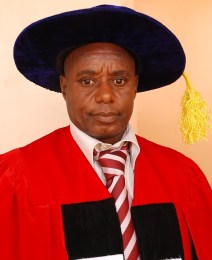 Prof. Bayole Rasheed OLOREDE, B.Sc., M.Sc., and Ph.D (U.I)
Prof. Bayole Rasheed OLOREDE, B.Sc., M.Sc., and Ph.D (U.I)
Provost, College of Agriculture
Email:
Prof. Bayole Rasheed OLOREDE, a Professor of Animal Science is a native of Iragbiji, Boripe Local Government, Osun State of Nigeria. He has B.Sc., M.Sc., and Ph.D degrees in Animal Science from University of Ibadan, in 1986, 1990 and 1998 respectively. He became a Professor in 2005 and was acting H.O.D., Animal Science from 2002 to 2004 at Usman Danfodiyo University Sokoto and at Osun State University, 2009 – 2011. [ Read More...]
![]()
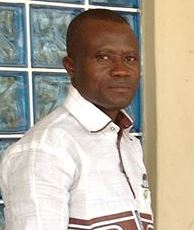 Dr. Sunday Bankole Adeyemi, B.Sc, M.Sc, PhD
Dr. Sunday Bankole Adeyemi, B.Sc, M.Sc, PhD
Acting Dean, Faculty of Education
![]()
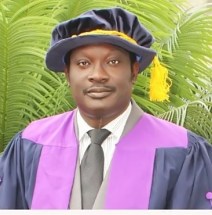 Professor ALEBIOSU Christopher Olutayo, BSc, MBChB, FWACP
Professor ALEBIOSU Christopher Olutayo, BSc, MBChB, FWACP
Provost, College of Health Sciences
Email:
Professor ALEBIOSU Christopher Olutayo is a fellow of the West African College of Physicians and an awardee of the Nigerian University Commission Award for indigenous research in 2004. He has also won competitive training fellowship awards from the World Diabetes Foundation Fellowship/International Diabetes Federation Fellowship Award (2003), International Society of Peritoneal dialysis Fellowship Training (2005) and IDF-BRIDGES Translational Research Grants Course, Ghana, 2008. [ Read More... ]
![]()
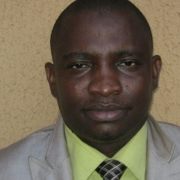
Dr Adebimpe W. Olalekan MBBS, MPH, FWACP, FRSPH, MNIM
Acting Dean, Faculty of Basic Medical Sciences
Email:
Dr. Adebimpe Wasiu Olalekan received his MBBS degree in 1998 from the University of Lagos, Masters in Public Health degree in 2005 from the University of Benin, and the Fellowship of the West African College of Physicians in 2008 in Public/Community Health. He is the Ag. Dean, Faculty of Basic Medical Sciences of the University. [ Read More... ]
![]()
COLLEGE OF HUMANITIES AND CULTURE
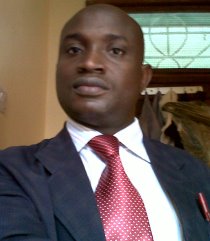
Dr. AKOH Ameh Dennis, B.A, M.A, Ph.D
Acting Dean, Faculty of Humanities
Email:
Dr Akoh is an Associate Professor of drama and critical theory in the Faculty of Humanities, Ikire Campus. He attended the universities of Jos and Ibadan, Nigeria where he also taught for some years. He was Head of the Department of Languages and Linguistics of Osun State University (2010-2012); Sub-Dean (2006-2009) of the Faculty of Arts and Humanities at the Kogi State University, Anyigba, Nigeria where he taught for seven years...[ Read More... ]
![]()
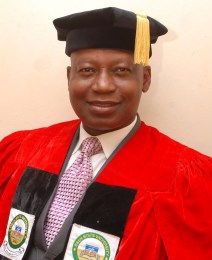 Prof. O. O. Oladele, a Professor of Commercial Law
Prof. O. O. Oladele, a Professor of Commercial Law
Provost, College of Law
Email:
Prof. O. O. Oladele, a Professor of Commercial Law is a member of Senate, the Chairman, Committee of Provosts, Deans and Directors, pioneer Provost, College of Law as well as Professor of business law of the Osun State University, Osogbo. He heads the Ifetedo Campus of the University. He is one of the leading scholars in securities regulation in Nigeria. [ Read More... ]
![]()
COLLEGE OF MANAGEMENT AND SOCIAL SCIENCES
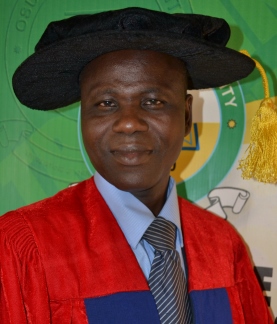 Prof. D.I. Akintayo, B.Sc (Hons), M.Sc, Ph.D
Prof. D.I. Akintayo, B.Sc (Hons), M.Sc, Ph.D
Provost, College of Management and Social Sciences
Email:
Prof. Akintayo is currently the Dean, Faculty of Management Sciences. He was born four decades ago at Odeomu township in Ayedaade Local Government Area of Osun State. He attended Community Grammar School. Ayetoro Tonkere between 1981-1985, where he obtained O/Level School Certificate with distinction. He further attended the then Oyo State College of Arts and Sciences (now Osun State College of Sciences), Ile-Ife between 1986-1988, where he obtained Advanced Level WAEC Certificate...[ Read More... ]
![]()
COLLEGE OF SCIENCE, ENGINEERING AND TECHNOLOGY
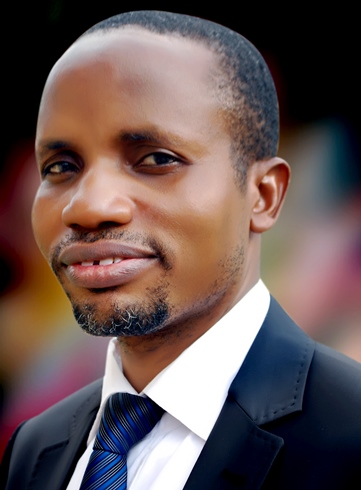 Professor Oguntola Jelil Alamu, B.Tech., M.Sc., Ph.D
Professor Oguntola Jelil Alamu, B.Tech., M.Sc., Ph.D
Dean, Faculty of Engineering
Email: ,
Oguntola Jelil ALAMU is a Professor in the Department of Mechanical Engineering of Osun State University, Osogbo, Nigeria. He obtained B.Tech. degree in Mechanical Engineering at the Ladoke Akintola University of Technology (LAUTECH), Ogbomoso, Nigeria in 1998, M.Sc degree in the same discipline at the University of Ibadan, Nigeria in 2001 and a Ph.D degree in Mechanical Engineering (Energy Studies and Renewable Energy) at LAUTECH, Ogbomoso, Nigeria in 2008... [ Read More... ]
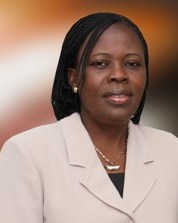 Dr. Janet Olubukola Popoola, B.Sc, M.Sc, Ph.D
Dr. Janet Olubukola Popoola, B.Sc, M.Sc, Ph.D
Acting Dean, Faculty of Basic and Applied Sciences
Email:
Dr. Janet Olubukola Olaitan, an Associate Professor joined the services of Osun State University, Osogbo, Nigeria in 2008. She graduated with a Bachelor of Science in Microbiology from Lagos State University in 1992 and subsequently Master of Science and Doctor of Philosophy in the same discipline in 1997 and 2005 respectively from University of Ibadan. Dr. Olaitan started her carrier as an Assistant lecturer with University of Agriculture, Abeokuta (UNAAB) in 1999 and rose to Lecturer I... [ Read More... ]
THE POSTGRADUATE COLLEGE
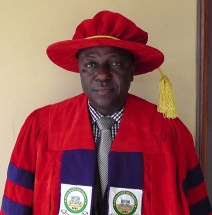 Professor A.W. Gbolagade, B.Sc (Ilorin), M.Sc (Ife), PGD and Ph.D (Ilorin)
Professor A.W. Gbolagade, B.Sc (Ilorin), M.Sc (Ife), PGD and Ph.D (Ilorin)
Provost, The Postgraduate College and Provost, College of Science, Engineering and Technology
Email:
Prof. Alagbe Wasiu GBOLAGADE, a Professor of Mathematics, obtained the Bachelor of Science (B.Sc) degree in Mathematics with Second Class Honour Upper Division from the University of Ilorin, Ilorin in 1986 and Masters of Science (M.Sc) degree in Mathematics from Obafemi Awolowo University, Ile-Ife in 1990. In addition, he obtained a Postgraduate Diploma in Computer Science from Ladoke Akintola University of Technology, Ogbomoso in 1994 and Doctor of Philosophy (Ph.D) degree in Mathematics from University of Ilorin, Ilorin, Kwara State in 1997. [ Read More... ]
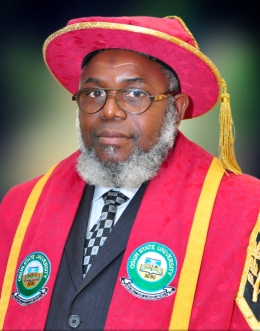
Prof. Bashiru Adekunle OKESINA, MBBS (Lagos), FPMCN, FWACP
Email:
Professor Bashiru Adekunle Okesina, a Chemical Pathologist, was born on October 11, 1954.
He graduated with Bachelor of Medicine and Bachelor of Surgery (MBBS) from the University of Lagos in 1980. He became a Fellow of Postgraduate Medical College of Nigeria in 1988 and Fellow of West African College of Physicians in 1989. [ Read More... ]
![]()
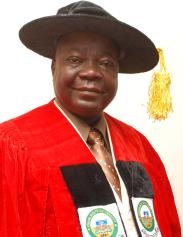 Dr. Julius Olusakin FANIRAN, B. A. (Hons), M. PA (Ife), Ph.D (Ib.), MNIM, FCPA
Dr. Julius Olusakin FANIRAN, B. A. (Hons), M. PA (Ife), Ph.D (Ib.), MNIM, FCPA
Email: ,
Dr. Faniran was born on September 6, 1956. He had his primary education between 1962 and 1967, his secondary education between 1968 and 1972, National Diploma in Secretarial Studies at The Polytechnic, Ibadan between 1974 and 1976 and his first degree between 1977 and 1981 at the University of Ife, Ile-Ife where he bagged and honours degree in English Language. [ Read More... ]
![]()
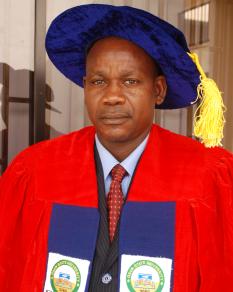 Mr. Fatai A. LASISI, B.Sc. (Hons), MBA (Ife), ACTI, FCA, ICAN
Mr. Fatai A. LASISI, B.Sc. (Hons), MBA (Ife), ACTI, FCA, ICAN
Email: ,
Alhaji Fatai Adebayo Lasisi is a fellow of the prestigious Institute of Chartered Accountants of Nigeria (ICAN) and an Associate of Chartered Institute of Taxation (CITN). He graduated from University of Ilorin with a B. Sc. (Hons) degree in Public Administration with a Second Class Upper Division. He was awarded with the Departmental prize for the best student in the Department in 1986. He also bagged a Masters degree of Obafemi Awolowo University, Ile-Ife.[ Read More... ]
![]()
 Mr. Ajibola Maxwell OYINLOYE B.Sc, M.L.S.
Mr. Ajibola Maxwell OYINLOYE B.Sc, M.L.S.
Email:
The University Librarian of Osun State University, is Mr. Ajibola Maxwell Oyinloye, a native of Ilesa in Osun State, was born on 15 August, 1956. He attended the Usman Dan Fodio University, Sokoto (formerly University of Sokoto) and came out with B.Sc. (Hons.) Physics Second Class, Upper Division and also has M.L.S from the University of Ibadan in 1985....[ Read More... ]
1. Project 106511: Sustainable production and utilization of the indigenous vegetables of southwest Nigeria for economic empowerment(NICANVEG). Project Website: http://www.uniosun-nicanveg.org/Home_Page.html
The project is undertaken under the Canadian International Food Security Research Fund (CIFSRF) with the financial support of the International Development Research Centre (IDRC), and the Government of Canada, provided through the Department of Foreign Affairs, Trade and Development (DFATD). On underutilized indigenous vegetables, the research is using a participatory approach involving rural women, farmers and scientists to conduct the ecological impact assessments of crop diversification, economic and financial analyses, conventional propagation studies using stem cuttings and seeds as planting materials, product processing and preservation and value addition studies. A major focus of the research is training of poor rural women and farmers on production, processing, utilization and marketing of underutilized vegetables for food security and financial empowerment.
This project is a joint collaboration among four (4) partners, the Osun State University and Obafemi Awolowo University in Nigeria and the University of Manitoba and Cape Breton University in Canada. Both Nigerian Universities are strongly supported by participation of the FADAMA group. The research consists of expertise in food science, soil science, horticulture and plant science, economics, gender specialists, agriculture extension, and rural sociologists. The The Nigerian Universities are conducting the entire field work at sixteen (16) field sites in Nigeria. Project training and scientific mentoring for key participants is being provided in Canada.
The Canadians teams; University of Manitoba and Cape Breton University, are providing short-term training platform for Nigerian scientists and students working on this project. The Cape Breton University is providing training in ecology, economics, marketing, and gender analysis and advice on project implementation, monitoring and reporting. The University of Manitoba is involved in training in soils, agronomy and food science and advice on project implementation, monitoring and reporting. The expertise of the third party (Helping Hands Resource Centre for Immigrants, Canada) in packaging research information, translating, disseminating and demonstrating the project findings through cooking workshops, food preparation training on leaf vegetables at the rural level will also benefit this project.
2.Knowing each other: every-day religious encounters, social identities and tolerance in south-west Nigeria
Project Website: http://www.birmingham.ac.uk/schools/historycultures/departments/dasa/research/knowing/team.aspx
Funded by the European Research Council (ERC), the research project maps out possibilities for the study of everyday religious encounter among the multi-religious Yoruba people of southwest Nigeria. In addition to more traditional historical and anthropological methods, it draws on an ethnographic door-to-door survey of over 2,500 respondents from different Nigerian states and from rural as well as urban communities which offers information on a wide range of topics. The project will focus especially on the topics of gender and marriage, youth and education, life and family histories, death and funerals as well as moral frameworks and meaning.
By exploring the ways in which different social identities are linked to dispositions and sensibilities that enable the avoidance or resolution of inter-religious conflicts, our research will develop comparative insights into different forms of tolerance in Yoruba society. We hope to explore whether there are tolerant dispositions or forms of habitus that will enable us to develop a comparative framework that can include forms of tolerance in other societies.
Also, while Yoruba religious debates are not free from relations of power, they are also earnestly engaged in the construction of meaning. The proposed research will explore religious discourse as a locus of lived engagement with moral frameworks, and of individual struggles for the creation and contestation of meaning, and it will seek to understand the specific as well as the general conditions under which meaningful discourse occurs.
3. Project 107983: Micro-dosing indigenous vegetables to combat poverty (Micro-Veg)
This project is funded by the Canadian Government IDRC-DFATD for 2015-2019. Chronic food insecurity is undermining development in Subsaharan West Africa. The general objective of the project is to increase food, nutritional, and economic security of smallholder farming communities in Nigeria and Benin. Specifically, we will accomplish this via accelerating the large-scale adoption of underutilized indigenous vegetables and improved soil fertility management practices. The specific objectives are to: (1) Develop technology capsule on fertilizer micro-dosing and water management technologies, value addition technology and seed production for indigenous vegetables. (2)Test, demonstrate and deploy two different models (Innovations Platform and Satellite Dissemination Approach) for reaching and benefiting more farmers with sustainable vegetable production and marketing innovations. (3) Scale up the technology capsule to advance indigenous vegetables production, increase yields, preserve soil and water ecosystems and enable fertilizer cost-saving. (4) Promote policy advocacy to integrate the successful scaling up model into local, national and regional food security programmes in the West African sub-region. Over a 36-month period, this project will support the generation of knowledge and innovations for large-scale positive economic changes in southwestern Nigeria and Benin.
 Prof. Bayole Rasheed OLOREDE, B.Sc., M.Sc., and Ph.D (U.I)
Prof. Bayole Rasheed OLOREDE, B.Sc., M.Sc., and Ph.D (U.I)
Dean, Faculty of Agriculture
Email:
Prof. Bayole Rasheed OLOREDE, a Professor of Animal Science is a native of Iragbiji, Boripe Local Government, Osun State of Nigeria. He has B.Sc., M.Sc., and Ph.D degrees in Animal Science from University of Ibadan, in 1986, 1990 and 1998 respectively. He became a Professor in 2005 and was acting H.O.D., Animal Science from 2002 to 2004 at Usman Danfodiyo University Sokoto and at Osun State University, 2009 – 2011. [ Read More...]
![]()
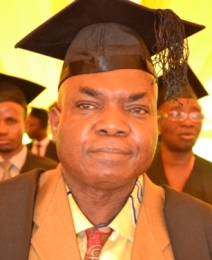 Prof. B. Alhassan, B.Sc, M.Sc, PhD
Prof. B. Alhassan, B.Sc, M.Sc, PhD
Acting Dean, Faculty of Education
Professor Alhassan was born on 3rd July, 1953 in Minna, in today’s Niger State. His ancestral roots are in Ogbomoso, Oyo State. He attended Baptist High School, Ede, Advanced Teachers College, Sokoto, the Ahmadu Bello University for his B. A. Ed., M.Ed. degree programmes and the University of Wales, Cardiff, U.K. He taught in Ahmadu Bello University, Zaria, the University of Education, Winneba, Ghana and the National Open University of Nigeria, Lagos before joining the Osun State University, Osogbo on 15th July, 2009 as the first Professor of Educational Psychology. [ Read More... ]
![]()
 Professor ALEBIOSU Christopher Olutayo, BSc, MBChB, FWACP
Professor ALEBIOSU Christopher Olutayo, BSc, MBChB, FWACP
Provost, College of Health Sciences
Email:
Professor ALEBIOSU Christopher Olutayo is a fellow of the West African College of Physicians and an awardee of the Nigerian University Commission Award for indigenous research in 2004. He has also won competitive training fellowship awards from the World Diabetes Foundation Fellowship/International Diabetes Federation Fellowship Award (2003), International Society of Peritoneal dialysis Fellowship Training (2005) and IDF-BRIDGES Translational Research Grants Course, Ghana, 2008. [ Read More... ]
![]()
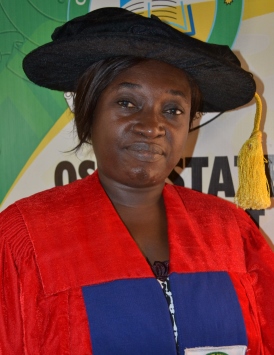
Dr. Mrs. M.O. Isawumi
Acting Dean, Faculty of Basic Medical Sciences
Email:
![]()
COLLEGE OF HUMANITIES AND CULTURE

Dr. AKOH Ameh Dennis, B.A, M.A, Ph.D
Acting Dean, Faculty of Humanities
Email:
Dr Akoh is an Associate Professor of drama and critical theory in the Faculty of Humanities, Ikire Campus. He attended the universities of Jos and Ibadan, Nigeria where he also taught for some years. He was Head of the Department of Languages and Linguistics of Osun State University (2010-2012); Sub-Dean (2006-2009) of the Faculty of Arts and Humanities at the Kogi State University, Anyigba, Nigeria where he taught for seven years...[ Read More... ]
![]()
 Prof. O. O. Oladele, a Professor of Commercial Law
Prof. O. O. Oladele, a Professor of Commercial Law
Dean, Faculty of Law
Email:
Prof. O. O. Oladele, a Professor of Commercial Law is a member of Senate, the Chairman, Committee of Provosts, Deans and Directors, pioneer Provost, College of Law as well as Professor of business law of the Osun State University, Osogbo. He heads the Ifetedo Campus of the University. He is one of the leading scholars in securities regulation in Nigeria. [ Read More... ]
![]()
COLLEGE OF MANAGEMENT AND SOCIAL SCIENCES
 Prof. D.I. Akintayo, B.Sc (Hons) (U.I), M.Sc (Jos), Ph.D (Uniport)
Prof. D.I. Akintayo, B.Sc (Hons) (U.I), M.Sc (Jos), Ph.D (Uniport)
Dean, Faculty of Management Sciences
Email:
Prof. Akintayo is currently the Dean, Faculty of Management Sciences. He was born four decades ago at Odeomu township in Ayedaade Local Government Area of Osun State. He attended Community Grammar School. Ayetoro Tonkere between 1981-1985, where he obtained O/Level School Certificate with distinction. He further attended the then Oyo State College of Arts and Sciences (now Osun State College of Sciences), Ile-Ife between 1986-1988, where he obtained Advanced Level WAEC Certificate...[ Read More... ]
![]()
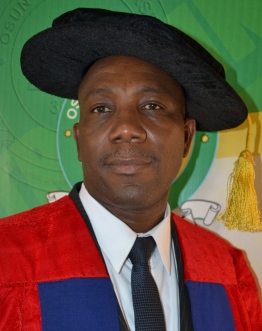
Dr. Anthony Kola-Olusanya, B.Sc (Hons), M.Sc, Ph.D
Acting Dean, Faculty of Social Sciences
Email:
Anthony Kola-Olusanya, PhD is presently a Senior Lecturer in the Department of Geography, Faculty of the Social Sciences, College of Management and Social Sciences, Osun State University. He received his PhD from the University of Toronto, specializing in Environmental Sustainability. He has honed his teaching and research skills at the Osun State University, Nigeria; Queen’s University, Kingston, Canada and the Lagos State University, Nigeria...[ Read More... ]
![]()
COLLEGE OF SCIENCE, ENGINEERING AND TECHNOLOGY
 Professor Oguntola Jelil Alamu, B.Tech., M.Sc., Ph.D
Professor Oguntola Jelil Alamu, B.Tech., M.Sc., Ph.D
Dean, Faculty of Engineering
Email: ,
Oguntola Jelil ALAMU is a Professor in the Department of Mechanical Engineering of Osun State University, Osogbo, Nigeria. He obtained B.Tech. degree in Mechanical Engineering at the Ladoke Akintola University of Technology (LAUTECH), Ogbomoso, Nigeria in 1998, M.Sc degree in the same discipline at the University of Ibadan, Nigeria in 2001 and a Ph.D degree in Mechanical Engineering (Energy Studies and Renewable Energy) at LAUTECH, Ogbomoso, Nigeria in 2008... [ Read More... ]
 Dr. Janet Olubukola Popoola, B.Sc, M.Sc, Ph.D
Dr. Janet Olubukola Popoola, B.Sc, M.Sc, Ph.D
Acting Dean, Faculty of Basic and Applied Sciences
Email:
Dr. Janet Olubukola Olaitan, an Associate Professor joined the services of Osun State University, Osogbo, Nigeria in 2008. She graduated with a Bachelor of Science in Microbiology from Lagos State University in 1992 and subsequently Master of Science and Doctor of Philosophy in the same discipline in 1997 and 2005 respectively from University of Ibadan. Dr. Olaitan started her carrier as an Assistant lecturer with University of Agriculture, Abeokuta (UNAAB) in 1999 and rose to Lecturer I... [ Read More... ]
THE POSTGRADUATE COLLEGE
 Professor A.W. Gbolagade, B.Sc (Ilorin), M.Sc (Ife), PGD and Ph.D (Ilorin)
Professor A.W. Gbolagade, B.Sc (Ilorin), M.Sc (Ife), PGD and Ph.D (Ilorin)
Provost, The Postgraduate College
Email:
Prof. Alagbe Wasiu GBOLAGADE, a Professor of Mathematics, obtained the Bachelor of Science (B.Sc) degree in Mathematics with Second Class Honour Upper Division from the University of Ilorin, Ilorin in 1986 and Masters of Science (M.Sc) degree in Mathematics from Obafemi Awolowo University, Ile-Ife in 1990. In addition, he obtained a Postgraduate Diploma in Computer Science from Ladoke Akintola University of Technology, Ogbomoso in 1994 and Doctor of Philosophy (Ph.D) degree in Mathematics from University of Ilorin, Ilorin, Kwara State in 1997. [ Read More... ]
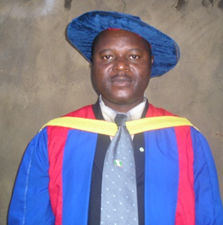 Professor O.C. Adebooye
Professor O.C. Adebooye
Director, Research and Linkages, Osun State University, Osogbo.
Professor of Plant Physiology.
B. Agric.(Plant Science) OAU, Ile-Ife, MSc and PhD (Agronomy/Plant Physiology) Ibadan. Certificate in Tissue Culture techniques (United Nations University, Tokyo), Certificate in Cytogenetics (IITA, Ibadan) and Certificate in Food and Plant Analysis (United Nations/CSIR, India).
- Fellow of the College of Research Associates (CRA), Tokyo, Japan.
- Postdoc United Nations University, CFTRI, Mysore, India.
- Fellow, Alexander von Humboldt Foundation at the University of Bonn, Germany.
- Fellow, German Academic Exchange Service (DAAD).
- Visiting Professor, University of Bonn, Germany
- Visiting Professor, University of Hohenheim, Germany.
He has won 12 competitive international research grants and attended about 70 international conferences in about 20 countries. Adebooye was the first Nigerian to win the Humboldt Alumni Scientist Award by the German Government’s Humboldt Foundation. Adebooye together with other three institutions won a $3 million research grant from IDRC, Canada. He has authored about 45 research articles and edited three books.
Recent Publications
- Adebooye O.C., M. Hunsche, G. Noga and C. Lankes(2011) Morphology and density of trichomes and stomata in Trichosanthes cucumerina L. (Cucurbitaceae) as affected by leaf age and salinity. Turkish Journal of Botany (In Press)
- Adebooye O.C. (2011) Food Value of Underutilized African Indigenous Vegetables: Preservation and Processing options to optimize nutrients supply. Keynote Paper Presented at the African Crop Science Conference, Maputo, Mozambique October 10- 14, 2011.
- Adebooye O. C., M. Schmitz-Eiberger, M. Hunsche, C. Lankes, and G. Noga Pigments, photochemistry, leaf ultra-structure and minerals quantification of Solanum macrocarpon L. as affected by salinity in a perlite-compost medium. Paper Presented at the African Crop Science Conference, Maputo, Mozambique October 10- 14, 2011.
- Adebooye O.C., M. Schmitz-Eiberger, C. Lankes and G.J. Noga (2010) Inhibitory effects of sub-optimal root zone temperature on leaf bioactive components, photosystem II (PS II) and minerals uptake in Trichosanthes cucumerina L- Cucurbitaceae. Acta Physiologiae Plantarum 32: 67- 73
- Adebooye O.C., K.A. Taiwo and A.A. Fatufe (Editors) (2010) Biotechnology development and threat of climate change in Africa: The case of Nigeria Volume 1. ISBN 978-3-86955-402-0Cuvillier Publishers Göttingen, Germany.. 311 pages
- Adebooye O.C., K.A. Taiwo and A.A. Fatufe (Editors) (2010) Biotechnology development and threat of climate change in Africa: The case of Nigeria Volume 2. ISBN 978-3-86955-403-7Cuvillier Publishers Göttingen, Germany.. 292 Pages.
- Adebooye O.C., G.J. Noga and C. Lankes (2009) Rooting zone temperature affects emergence and growth traits of Snake Tomato (Trichosanthes cucumerina L.). Journal of Central European Agriculture, 10(3): 239-244
Recent Project:
Professor O. Clement Adebooye of the Department of Agronomy, Osun State University in collaboration with scientists from the Obafemi Awolowo University, Ile-Ife(OAU); Cape Breton University, Nova Scotia, Canada (CBU) and University of Manitoba, Canada (UofM) won the IDRC research grant under the programme: Canadian International Food Security Research Fund ( CIFSRF). The project is titled : “Sustainable production and utilization of under-utilized Nigerian vegetables to enhance rural food security.” The project will run for three and a half years (42 months) March 2011- August 2014.
The grant is about three (3) million dollars ($3.0 milion). Out of this amount, UNIOSUN has a total budget of about $1.1 million. The project will carry out survey on indigenous vegetables of southwest Nigeria, conduct field research, determine nutraceutical properties of vegetables and vegetables products, carry out impact assessments, training of women farmers etc. On this project, ten (10) researchers from UNIOSUN will be trained at the CBU and UofM, Canada on agricultural research planning, implementation and reporting.
